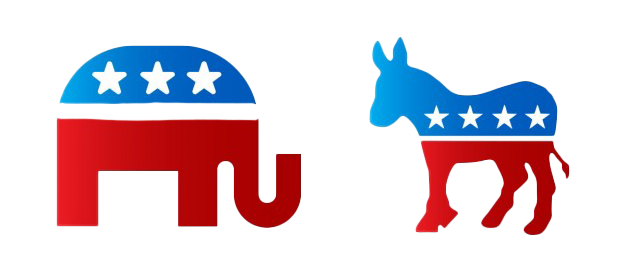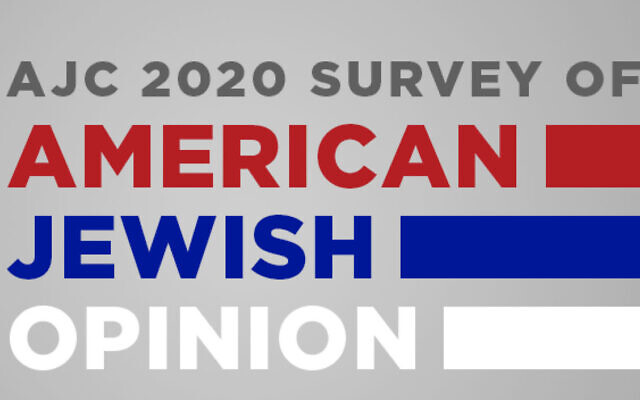AJC Survey Puts Non-Orthodox Jews in Biden’s Corner
In the AJC's annual survey, Trump’s support was greatest among Orthodox Jews, who also gave him higher marks for his job performance as president.
Dave Schechter is a veteran journalist whose career includes writing and producing reports from Israel and elsewhere in the Middle East.
Three-quarters of Jewish adults surveyed for the American Jewish Committee during September and October backed former vice president Joe Biden for president, according to the AJC’s annual survey of American Jewish opinion, released Oct. 19.
Biden, the Democratic nominee, received 75 percent and incumbent Republican President Donald Trump 22 percent in the survey of 1,334 Jewish adults conducted Sept. 9 to Oct. 4 by the research company SSRS. The survey came with a margin of error of plus or minus 4.2 percentage points.
Nearly three-quarters (74 percent) of Orthodox respondents backed Trump’s re-election, compared with 23 percent on Conservative respondents, 20 percent of Reform, 3 percent of Reconstructionist, and 14 percent of those identifying as secular. Biden, conversely, was backed by 72 percent of Conservative Jews, 78 percent of Reform, 93 percent of Reconstructionist, and 83 percent of secular.
Overall, 77 percent of the respondents disapproved of Trump’s job performance. Broken down by affiliation, however, 75 percent of Orthodox respondents approved of Trump’s performance, compared with 24 percent of Conservative, 20 percent of Reform, 4 percent of Reconstructionist, and 15 percent of those identifying as secular.
The COVID-19 pandemic ranked as the most important election issue for American Jews, with 26 percent; followed by health care, 17 percent; the economy, 13 percent; race relations, 12 percent; crime, 6 percent; foreign policy, 5 percent, and an unnamed “some other issue” at 20 percent.
Biden was adjudged to be better than Trump in every issue area surveyed: combatting terrorism (71 percent to 26 percent), uniting the country (79 percent to 15 percent), strengthening U.S.-Israel relations (54 percent to 42 percent), dealing effectively with Iran (71 percent to 27 percent), handling the COVID-19 pandemic (78 percent to 19 percent), combating antisemitism in the U.S. (75 percent to 22 percent), and handling crime (62 percent to 16 percent).
The AJC survey asked about foreign policy as an issue but not specifically about Israel. However, when asked about the statement “Caring about Israel is a very important part of my being a Jew,” 62 percent agreed, and 35 percent disagreed. Respondents overwhelmingly agreed that the U.S.-Israel relationship today is strong (52 percent fairly strong and 33 percent very strong).

The AJC also asked how respondents feel about the prospects for peace between Israel and the Arab world, compared with a year earlier. Nearly half (49 percent) said there hasn’t been much change, while 37 percent were more optimistic, and 13 percent less optimistic. Israel announced improved diplomatic relations with the United Arab Emirates in August, with Bahrain in mid-October. The White House has said that it expects several other Arab nations to follow suit; at this writing, Sudan is reported the next most likely.
The AJC survey found less optimism about the prospects for peace between Israel and the Palestinians compared with a year ago. More than half (55 percent) said there hasn’t been much change, while 28 percent were less optimistic, and 16 percent more optimistic.
The survey asked the respondents to identify themselves in several ways. For example, 53 percent were Democrats, 25 percent independents, 14 percent Republican, and 8 percent, other. In terms of political philosophy, 57 percent called themselves liberal or lean liberal; 25 percent, moderate, middle of the road, and 17 percent lean conservative or conservative.
More than two-thirds felt that the Republican party held a lot (27 percent) or some (42 percent) anti-Semitic views. Meanwhile, more than one-third felt that the Democratic party held a lot (11 percent” or some (26 percent) anti-Semitic views.
Nearly three-quarters (72 percent) considered the political right a very serious or moderately serious problem, compared with about one-third who held the political left to be a very serious or moderately serious problem. Extremism in Islam was considered a very serious problem by 27 percent and moderately serious by 26 percent.
By religious identification, 43 percent were secular; 27 percent Reform; 12 percent Conservative; 9 percent Orthodox; 4 percent Reconstructionist; and 5 percent did not know or refused to answer.
Being Jewish was very important to 39 percent of respondents, somewhat important to 41 percent, not too important to 16 percent, and not at all important to 5 percent.
By marital status, 47 percent were unmarried, 25 percent were married to someone born Jewish, 3 percent were married to a convert to Judaism, and 25 percent were married to a non-Jew.




comments